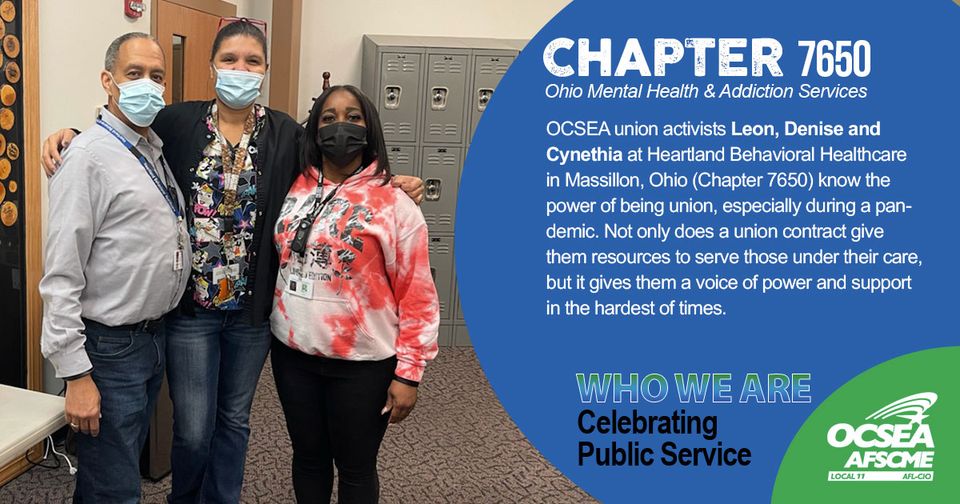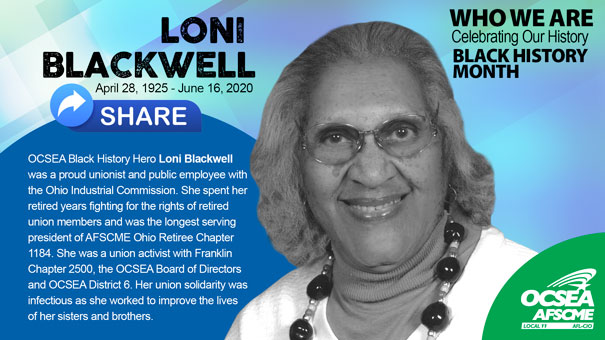Black history and racial justice is so intrinsically intertwined with the labor movement. Together these movements have worked side-by-side to fight for union representation that ensures workplace safety, higher wages, benefits to take care of our families and pensions so we can all retire with dignity. Today, labor movement activists continue to lead the way in the fight for American economic and workplace justice!
This Black History Month, we continue to honor African-American union activists of today and yesterday, including both OCSEA activists and unionists around our great and diverse nation.
OCSEA activist, CMCA chair Sherry Little
OCSEA sister Sherry Little chairs the union's Minority and Community Affairs Committee (CMCA). Sherry is a proud union activist and steward for her Workers’ Compensation chapter in Cleveland. Sherry and her committee team of OCSEA activists around the state educate union members about the vital role that minority Ohio union members play in public service and in our communities. Shout out to Sherry's CMCA team for being the voice of so many union members across Ohio!
Black history and racial justice are so intrinsically intertwined with the labor movement. Together these movements have worked side-by-side to fight for union representation that ensures workplace safety, higher wages, benefits to take care of our families and pensions so we can all retire with dignity. Today, labor movement activists continue to lead the way in the fight for American economic and racial justice!

OCSEA steward, activist Fred Jones
OCSEA brother Fred Jones is a real tour de force in his Ohio Department of Health chapter. As a volunteer steward and union activist, he works diligently for his ODH Chapter 2560 to make sure the union contract is adhered to and that his health agency union members, from scientists to maintenance crews, are protected on the job.
Fred has worked for the state health agency for over 17 years. He is an ODH Inventory Control Specialist 2 whose job is making sure ODH scientists and lab employees have the supplies and materials they need to do their jobs and keep Ohioans safe. Prior to state service, Fred served in the U.S. Army where he maintained unit weapons for an armory. After that, he worked as a supply coordinator for a private sector long-term care company. You can read more about Fred and his union sisters and brothers at the Ohio Department Health in the upcoming edition of the union magazine, hitting homes later this month.

MHAS Massillon Chapter 7650
This Black History Month we're celebrating our OCSEA activists making a difference at our state psychiatric hospitals. Activists like Chapter 7650's Leon, Denise and Cynethia at Heartland Behavioral Healthcare in Massillon, who know the power of being union, especially during a pandemic. Not only does a union contract give them resources to serve those under their care, but it gives them a voice of power and support in the hardest of times. Learn more about our OhioMHAS union activists in the upcoming edition of the union magazine coming at OCSEA.org/PEQ.
SHARE:

Remembering OCSEA retiree activist Loni Blackwell
Who We Are is reflective of those who came before us. This Black History Month we honor our OCSEA labor heroes, including the legacy of our sister Loni Blackwell who fought decades for union members and retirees. OCSEA Black History Hero Loni Blackwell was a proud unionist and public employee with the Ohio Industrial Commission. She spent her retired years fighting for the rights of retired union members and was the longest serving president of AFSCME Ohio Retiree Chapter 1184. She was a union activist with Franklin Chapter 2500, the OCSEA Board of Directors and OCSEA District 6. Her union solidarity was infectious as she worked to improve the lives of her sisters and brothers.

Remembering our First African-American President: Walter Kyle
Who We Are is reflective of those who came before us. This Black History Month we honor the legacy of Walter Kyle, OCSEA’s first African American President. Kyle served as an executive officer of the union as President-Elect, President and Past President from 1976-1982 and was a force within the union for decades. Kyle was a war hero, serving with the Central Ohio Tuskegee Airmen in WWII where he lost a leg in action. Kyle's love of flying helped form his career as an ODOT Aerial Engineer, where he worked mapping out our state roadways. Kyle was a major union player on the state level and in building up what is now the OCSEA Central Ohio ODOT chapter. He was president of the original ODOT Aerial Engineering chapter. He served as steward in the years before hard-fought collective bargaining was a state law won by the union. Share President Kyle's story on Facebook.


The intrinsic links between black history and labor, this month and every month
Black history and racial justice is so intrinsically intertwined with the labor movement. Together these movements have worked side-by-side to fight for union representation that ensures workplace safety, higher wages, benefits to take care of our families and pensions so we can all retire with dignity. Today, labor movement activists continue to lead the way in the fight for American economic and workplace justice!
When talking about our vast OCSEA and AFSCME history, we'd be remiss if we didn't mention the AFSCME Memphis Sanitation Strike that left an indelible mark on our labor and Black history. Fifty-four years ago this month, two Memphis sanitation workers, Robert Walker and Echol Cole, were crushed to death when the gears on their truck malfunctioned. The workers’ repeated warnings about old and dangerous equipment had been ignored by the city. In response, Walker and Cole’s co-workers—1,300 African American men represented by AFSCME Local 1733—went on strike. It was a signature moment in labor history and Black history, and one that would cost Dr. Martin Luther King, Jr. his life.
Recently our AFSCME International President Lee Saunders, an influential African-American labor activist today and former OCSEA union leader, recently sat down with other labor and civil rights activists to talk about AFSCME's Black history and this historic strike that still guides us today. Learn more.
